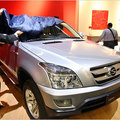From Economist.com
Nicolas Sarkozy is comfortably elected as president. He immediately calls for France to change
 | |
THE French turned out en masse on Sunday May 6th to elect Nicolas Sarkozy as their new president, handing him 53% of the vote, next to 47% for his Socialist rival, Ségolène Royal. Ms Royal conceded, just one minute after the first results were broadcast on election night, leaving the Gaullist 52-year-old former lawyer to take to the stage at a theatre in central Paris. Speaking of the "immense emotion" he felt, he declared that his was "not the victory of one France against another", and promised "to be the president of all the French."
Polls had made Mr Sarkozy the favourite for weeks, but the margin often looked narrow. Two elements seemed to have lifted his score late in the campaign. One was his performance during a televised debate with Ms Royal, in which he kept his cool and stuck to his policy briefs, while she lashed out at him with surprising aggression. The other was that, while Ms Royal made an abrupt turn away from her political base on the left in a bid to court the centre ground, Mr Sarkozy kept to his first-round message: essentially, that France has to change, that work needs to be valued, effort rewarded, and authority strengthened. In the end, he won not only some two-thirds of the far-right vote, but half of the centrist vote too—despite the decision of François Bayrou, the centrist leader, not to back Mr Sarkozy.
It was, in many ways, a remarkable performance. Mr Sarkozy was, until a few weeks ago, a minister in an unpopular government under a tired president, Jacques Chirac. This was the Socialist Party's election to lose. As it is, the Gaullists have now won three consecutive presidential polls, and are set for a run of 17 years in power. Mr Sarkozy's victory was built on a message of change—rupture is his favourite word—that many analysts considered far too risqué for the supposedly conservative French. This election has shown that, given leadership and a charismatic candidate, they too are ready to adapt their country. By sheer drive and political cunning, Mr Sarkozy managed to build up an electoral machine, through the party that Mr Chirac originally founded, and reinvent himself—30 years after entering electoral politics—as a force for change.
The question now is how far Mr Sarkozy will be able to implement some of the controversial reformist elements of his programme. In his election-night speech, he declared that "the French people have chosen change.” Among the first reforms that he intends to bring about are labour-market measures: he plans to secure minimum service on public transport during strikes; to break the big five unions' stranglehold on union representation; to change the unemployment-benefit rules to penalise those who refuse two job offers; and to introduce a single job contract with progressive rights.
Unlike President Chirac, who in 1995 also tried to bring about reform but had been elected on an uncontroversial promise to "heal the social fracture", Mr Sarkozy arrives in office with a clear mandate to change. Not only was his score high, but turn-out—at about 85%—was too. Mr Sarkozy knows that he has to move fast to capitalise on that. On minimum service for trains and buses, for instance, he says that he will let the unions and bosses' organisations try to negotiate a deal until the end of the summer; after that, in the absence of agreement, he will legislate. There will doubtless be resistance, and strikes and street protests are widely predicted. Indeed, on election night there were already clashes between riot police and anti-Sarkozy protesters.
Mr Sarkozy has until May 16th to name a prime minister—François Fillon is tipped for the job—who will form an interim government until legislative elections are held in June. The Socialist Party also needs to prepare to defend its parliamentary seats. But it is now under strain, with its moderate members and its left-wing already blaming each other for defeat. It may be that Mr Sarkozy's victory, and the humiliation of the third consecutive presidential defeat, is what it takes to force the Socialists finally to break with the past and construct a modern party of the left.



